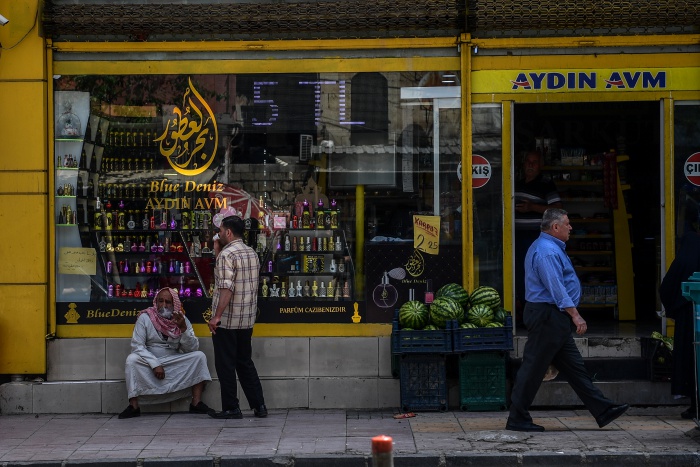Turkey’s large Syrian refugee population has become a political football as an economic crisis overshadows next year’s presidential election and parties spar over sending them back to their war-torn homeland.
Millions of Syrians have settled in neighboring Turkey since 2012. A 2016 deal with the European Union offered Ankara incentives for taking them in, after some member states balked at hosting large numbers of Middle Eastern migrants.
With the lira’s value tumbling to historic lows and annual inflation running at nearly 70 percent, aggravated by the Russia-Ukraine war, the refugee question regularly marks political debate.
But analysts told AFP that Turkey’s 3.7 million Syrian refugees have no appetite to go back home and that plans to return them to Syria are unfeasible.
President Recep Tayyip Erdoğan, in power since 2003 and tipped to win the June 2023 vote, wants to encourage the refugees’ “voluntary” return, pledging to build more infrastructure in a Syrian region where Ankara has deployed troops since 2016.
Turkey has already inaugurated several thousand briquette houses in the Idlib region — the last opposition bastion in northwestern Syria — to facilitate the return of Syrians to “safe zones” along the border.
At the same time, the Turkish leader has vowed to “protect up to the end our brothers who fled the war and took refuge in our country”, refusing to throw them into the “lap of murderers”.
His comments run contrary to the radical argument of the main opposition CHP, whose leader Kemal Kılıçdaroğlu promised to send Syrians back if elected in 2023.
Kılıçdaroğlu has accused Erdoğan of seeking to “naturalize the refugees in exchange for their vote”, while the extreme right-wing Victory Party has denounced a “silent invasion” by migrants.
Some Turks accuse Syrians of “stealing their jobs” or “escalating rental prices”.
– Idlib ‘safe zone’ –
“Nobody has revealed the mechanism of repatriation,” said Omar Kadkoy, a research associate at the Ankara-based TEPAV think-tank.
Kadkoy said an Ankara-led voluntary repatriation scheme would take time and questioned the legality of Turkish construction on Syrian territory.
“On whose land are you building this housing?” the analyst asked, saying a swift execution of the plan sounded “very unrealistic”.
A massive return to Syria is out of the question for now, partly because Ankara and Syrian President Bashar al-Assad cannot reach an agreement until Turkey leaves the occupied areas, Murat Erdoğan, director of Ankara University’s migration research center, told AFP.
The so-called Idlib “safe zone” is already overpopulated. It can shelter one million people and now hosts four million, he added.
But it is “too artificial” and “too risky” for Syrians to settle there, Erdoğan warned. “Nobody knows for how long Turkey will remain in control and how long it will stay over there.”
“Plus you have to consider that people outside the region are willing to join it too” and are practically dependent on diminishing international aid, he added.
– ‘Huge challenge’ –
Analyst Erdoğan told AFP Turkey was hosting more than five million refugees, which he called a “huge challenge” for its people.
“Now they recognize they [refugees] will stay as they do not tend to go back,” he said, with tensions rising since the Covid pandemic and the economic crisis.
A little more than one percent of Syrian refugees live in camps and the vast majority have settled in Turkish society since 2012, he added.
International solidarity is waning after 11 years of civil war. Donors pledged $6.7 billion (6.4 billion euros) for Syria at a conference in Brussels Tuesday — well below the $10.5 billion the United Nations had sought.
Russia, a major ally of Assad, has announced that it will oppose the renewal of a UN resolution in July authorizing the passage of humanitarian aid through Turkey.
And there is a “risk”, said analyst Erdoğan, that an influx of an additional four million refugees could turn up in Turkey and beyond in Europe.
© Agence France-Presse

